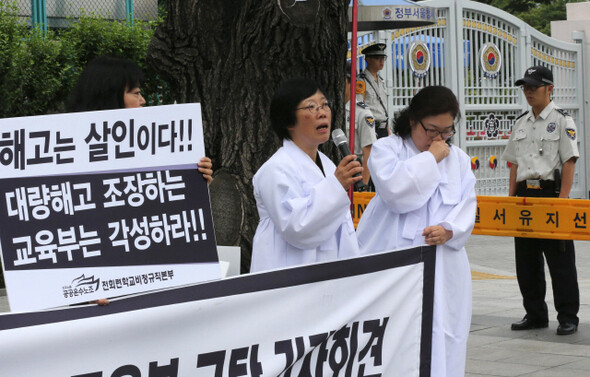hankyoreh
Links to other country sites 다른 나라 사이트 링크
Education ministry avoiding giving stable jobs to English instructors

By Eum Sang-won, staff reporter
Four middle-aged women wearing funeral clothes stood in front of the Central Government Complex in Seoul at around 11am on June 19.
“The government’s inconsistent education policies have left all the powerless irregular workers out of jobs,” they declared. The women, English conversation instructors for elementary and middle school classes, called for indefinite contracts. Ko Sun-gyung, who heads the Association for Professional English Conversation Instructors, blasted the Ministry of Education for “sending out an announcement to make it appear that this was lifetime employment, only to turn around and later backpedal.”
“We’ve been trying to help advance public education by teaching English to children in farming and fishing villages who don’t have access to private education,” she said.
“Now, 6,100 English teachers have ended up being cast aside like old shoes.”
English conversation instructors are facing imminent, massive layoffs. They are the last 526 of the 1,300 who first signed contracts with schools in August 2009. This August marks the end of their four-year legal employment period. They won’t be able to teach after that unless they are rehired.
The layoffs are part of the ministry’s policy. Last October, it sent a document to metropolitan and provincial offices of education telling them to hire new English instructors after the current four-year contracts expire. The 526 who are facing an end to their contracts in August were originally selected in 2009 based on tests by local agencies. The system has since changed, and the instructors would have to go through a new hiring process to get their jobs back. Even if they succeed in getting rehired, they will still have to face the same uncertain situation after four years.
The ministry’s policies have been criticized for leading to a proliferation of low-quality positions - a “rob Peter to pay Paul” strategy - in which permanent slots are filled with temporary workers on four-year contracts. The government’s approach is a professional instructor system aimed at incorporating areas where people depend on the private education market - including instruction of conversational English - into public schools.
But the teachers in question are only being given temporary positions.
Questions are also being raised about responsibility for the “bad checks” written to teachers. The ministry announced in October that it was amending an enforcement degree to the Elementary and Secondary Education Act to allow English instructors and other temporary school employees to work another four years once their original term is over. But the pledge has not been kept. On June 14, the ministry said it planned to regularize 110,000 temporary workers at schools by 2014 - but it maintains English instructors are excluded from this move.
“They aren’t eligible for indefinite contract status because they’re viewed as an exception to the Act on the Protection of Dispatched Workers,” a ministry official said on condition of anonymity. “And there are so many people who want jobs that they can’t give preferential treatment to the one with experience.”
Lee Tae-ui, head of the temporary school worker office of the Korean Confederation of Trade Unions, decried the decision.
“There are 162,000 English instructors and 200,000 temporary school workers who were not included in the government’s announcement on June 14,” Lee said. “Those people continue to face deep concerns about their employment prospects.”
There are expected to be mass layoffs of English instructors over the next few years. The 1,500 hired as part of the second group will see their four year contracts end in February 2014, while the 1,000 in the third group face an end to their contracts in February 2015.
Please direct questions or comments to [english@hani.co.kr]

Editorial・opinion
![[Column] Season 2 of special prosecutor probe may be coming to Korea soon [Column] Season 2 of special prosecutor probe may be coming to Korea soon](https://flexible.img.hani.co.kr/flexible/normal/500/300/imgdb/original/2024/0426/3317141030699447.jpg) [Column] Season 2 of special prosecutor probe may be coming to Korea soon
[Column] Season 2 of special prosecutor probe may be coming to Korea soon![[Column] Park Geun-hye déjà vu in Yoon Suk-yeol [Column] Park Geun-hye déjà vu in Yoon Suk-yeol](https://flexible.img.hani.co.kr/flexible/normal/500/300/imgdb/original/2024/0424/651713945113788.jpg) [Column] Park Geun-hye déjà vu in Yoon Suk-yeol
[Column] Park Geun-hye déjà vu in Yoon Suk-yeol- [Editorial] New weight of N. Korea’s nuclear threats makes dialogue all the more urgent
- [Guest essay] The real reason Korea’s new right wants to dub Rhee a founding father
- [Column] ‘Choson’: Is it time we start referring to N. Korea in its own terms?
- [Editorial] Japan’s rewriting of history with Korea has gone too far
- [Column] The president’s questionable capacity for dialogue
- [Column] Are chaebol firms just pizza pies for families to divvy up as they please?
- [Column] Has Korea, too, crossed the Rubicon on China?
- [Correspondent’s column] In Japan’s alliance with US, echoes of its past alliances with UK
Most viewed articles
- 1‘We must say no’: Seoul defense chief on Korean, USFK involvement in hypothetical Taiwan crisis
- 2[Column] Season 2 of special prosecutor probe may be coming to Korea soon
- 3N. Korean delegation’s trip to Iran shows how Pyongyang is leveraging ties with Moscow
- 4Korea sees more deaths than births for 52nd consecutive month in February
- 5Amnesty notes ‘erosion’ of freedom of expression in Korea in annual human rights report
- 6[Reportage] On US campuses, student risk arrest as they call for divestment from Israel
- 7[Editorial] New weight of N. Korea’s nuclear threats makes dialogue all the more urgent
- 8‘Weddingflation’ breaks the bank for Korean couples-to-be
- 9[Column] Has Korea, too, crossed the Rubicon on China?
- 10[Column] Park Geun-hye déjà vu in Yoon Suk-yeol